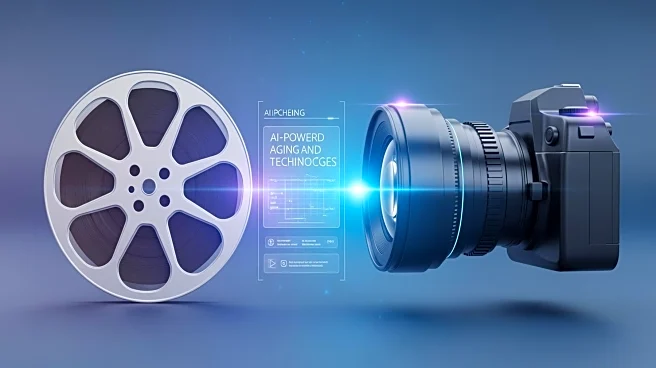What's Happening?
During the Lumière Festival on October 18, 2025, filmmaker Michael Mann announced the use of AI technology for aging and de-aging actors in his upcoming film 'Heat 2'. This announcement has sparked significant
debate among directors and casting professionals regarding the implications of AI in filmmaking. Mann emphasized that AI would be used only when there is a clear dramatic need, rather than for gratuitous CGI effects. 'Heat 2' is set to be released in approximately 4,000 U.S. cinemas with a minimum 45-day theatrical run, marking a substantial commitment to traditional cinema distribution. The film's production has moved from Warner Bros. to Amazon MGM, and will be shot in various international locations including Chicago, Los Angeles, Paraguay, and potentially Singapore.
Why It's Important?
The use of AI for aging and de-aging actors in films represents a potential shift in industry norms, affecting casting decisions, actor contracts, and the authenticity of performances. Supporters argue that this technology can enhance storytelling by allowing characters to be portrayed across different ages without changing actors. However, critics express concerns about the ethical implications, such as consent and compensation for actors whose likenesses are digitally altered. The decision by a high-profile director like Michael Mann to employ AI in a major theatrical release could set a precedent, influencing future productions and prompting discussions about the role of technology in creative processes.
What's Next?
As 'Heat 2' moves forward with its AI-driven approach, industry stakeholders including actors, agents, and unions are likely to closely monitor developments. There may be calls for clearer guidelines and contractual terms regarding the use of AI in film production, particularly concerning actor consent and compensation. The film's release and reception could influence other studios' decisions to adopt similar technologies, potentially accelerating legal and union negotiations around digital likeness rights and the ethical use of AI in entertainment.
Beyond the Headlines
The integration of AI in filmmaking raises broader questions about the future of creative industries. It challenges traditional notions of performance and authenticity, potentially altering how audiences perceive and value cinematic experiences. As technology continues to evolve, filmmakers may need to balance innovation with ethical considerations, ensuring that artistic integrity and fair labor practices are maintained. This development could also lead to new opportunities for storytelling, allowing for more dynamic and flexible narratives that span time and space.








